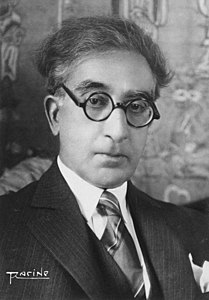Julian at the Mysteries
Constantine P. Cavafy 1863 (Alexandria) – 1933 (Alexandria)
But when he found himself in darkness,
in the earth's awful depths,
with a group of unholy Greeks,
and bodiless figures appeared before him
with haloes of light,
the young Julian for a moment lost his nerve:
an impulse from his pious years came back
and he crossed himself.
The Figures vanished at once;
the haloes faded away, the lights went out.
The Greeks glanced at each other.
The young man said: 'Did you see the miracle?
I'm frightened, friends. I want to leave.
Didn't you see how the demons vanished
the second they saw me make the holy sign of the cross?'
The Greeks chuckled scornfully:
'Shame on you, shame, to talk that way
to us sophists and philosophers!
If you want to say things like that,
say them to the Bishop of Nicomedia and his priests.
The greatest gods of our glorious Greece
appeared before you.
And if they left, don't think for a minute
that they were frightened by a gesture.
It was just that when they saw you
making that vile, that crude sign,
their noble nature was disgusted
and they left you in contempt.'
This is what they said to him, and the fool
recovered from his holy, blessed fear,
convinced by the unholy words of the Greeks.
Font size:
Submitted on May 13, 2011
Modified on April 14, 2023
- 1:05 min read
- 44 Views
Quick analysis:
| Scheme | ABCDEFGHIJKLMNOLPQRSTUVKUWXYZ1 C |
|---|---|
| Closest metre | Iambic tetrameter |
| Characters | 1,145 |
| Words | 217 |
| Stanzas | 1 |
| Stanza Lengths | 31 |
Translation
Find a translation for this poem in other languages:
Select another language:
- - Select -
- 简体中文 (Chinese - Simplified)
- 繁體中文 (Chinese - Traditional)
- Español (Spanish)
- Esperanto (Esperanto)
- 日本語 (Japanese)
- Português (Portuguese)
- Deutsch (German)
- العربية (Arabic)
- Français (French)
- Русский (Russian)
- ಕನ್ನಡ (Kannada)
- 한국어 (Korean)
- עברית (Hebrew)
- Gaeilge (Irish)
- Українська (Ukrainian)
- اردو (Urdu)
- Magyar (Hungarian)
- मानक हिन्दी (Hindi)
- Indonesia (Indonesian)
- Italiano (Italian)
- தமிழ் (Tamil)
- Türkçe (Turkish)
- తెలుగు (Telugu)
- ภาษาไทย (Thai)
- Tiếng Việt (Vietnamese)
- Čeština (Czech)
- Polski (Polish)
- Bahasa Indonesia (Indonesian)
- Românește (Romanian)
- Nederlands (Dutch)
- Ελληνικά (Greek)
- Latinum (Latin)
- Svenska (Swedish)
- Dansk (Danish)
- Suomi (Finnish)
- فارسی (Persian)
- ייִדיש (Yiddish)
- հայերեն (Armenian)
- Norsk (Norwegian)
- English (English)
Citation
Use the citation below to add this poem to your bibliography:
Style:MLAChicagoAPA
"Julian at the Mysteries" Poetry.com. STANDS4 LLC, 2024. Web. 24 Apr. 2024. <https://www.poetry.com/poem/7181/julian-at-the-mysteries>.



Discuss the poem Julian at the Mysteries with the community...
Report Comment
We're doing our best to make sure our content is useful, accurate and safe.
If by any chance you spot an inappropriate comment while navigating through our website please use this form to let us know, and we'll take care of it shortly.
Attachment
You need to be logged in to favorite.
Log In